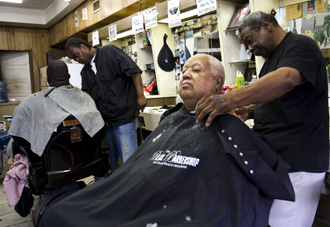Barbers to Snip Away Unhealthy Habits
Can hair stylists and barbers improve their clients' health when they come in for a trim every month? That's the question Tulane University public health researchers hope to answer with the Shop Talk Program, an initiative to train staff in urban New Orleans barbershops and beauty salons to talk to clients about eating habits, getting more exercise, managing their blood pressure and making other healthy choices.

Participating barbershops are located in Algiers, the Central Business District, Central City, Gentilly, eastern New Orleans and Mid-City, as well as the 7th, 8th and 9th Wards. (Photo by Ryan Rivet)
The Prevention Research Center of the School of Public Health and Tropical Medicine has produced 2,600 copies of a 28-page "Feel Good Guide: How to Stay Healthy" that will be displayed in 19 shops. It explains how 10 small dietary and lifestyle changes can make a big difference in health.
"The 'Feel Good Guide' focuses on the simple things we can all do to improve our health," says Lisa Hoffman, communications and training coordinator. "It also will draw people's attention to symptoms that may be indicative of an unknown condition for which medical care is necessary."
Topics are being more physically active, eating more fruits and vegetables, choosing low-salt foods, cutting back on junk food, managing diabetes, reducing alcohol intake, lowering blood pressure, quitting smoking, taking part in colon cancer screenings, and practicing safe sex. The guide contains healthy recipe cards, a directory of area free clinics and a body mass index calculator to determine healthy weight ranges. The guide and recipe cards are available online.
Tulane researchers have conducted health surveys of patrons at participating barbershops and salons. They will return after one month to see if the program had an impact on attitudes and behaviors regarding health issues covered in the books. Six other salons will serve as a control group.
The program is primarily aimed at reaching African Americans, who are disproportionately affected by chronic diseases like heart disease, diabetes and certain cancers.
